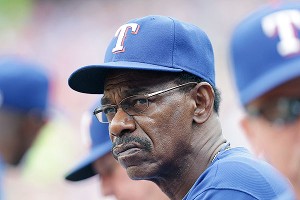No one has more wins in club history than Washington, who passed Bobby Valentine with the Rangers? series win in Oakland. It was a fitting place for Washington to earn the mark, since he spent more than a decade with the A?s as one of the top instructors in baseball.
[+] Enlarge AP Photo/LM Otero
AP Photo/LM OteroRon Washington picked up his 582nd victory with the Rangers on Sunday, further validating he is the finest manager in the history of the franchise.
But Washington was the greatest Rangers manager before he claimed win No. 582 as the skipper.Some of you will argue that the total number of wins doesn?t make Washington a great manager. He bunts too much. He goes with his gut too much. He needs a quicker hook. He?s too loyal and slow to change at times. He benefits from a smart front office and a wealth of young talent.
Some of those points are certainly valid. But couldn?t you make that case about nearly every manager in baseball? What gets lost in the second-guessing of late-inning pitching changes or pinch-hitting opportunities is why Washington was hired in the first place.
General manager Jon Daniels knew he wasn?t getting a shrewd statistician who would play the percentages. He knew he wasn?t getting someone who would make all the right moves.
Daniels hired someone who could teach a young team and an organization about how to win games and create a culture in which teammates relied on one another. He tabbed Washington because he saw in him a terrific motivator and someone who would, no matter how hard it might become, demand that pitching and defense become the hallmark of a contending team, instead of relying too much on a hard-hitting offense.
That?s what makes Washington great. He has helped mold this organization into a consistent winner. The front office has used shrewd trades, solid investment in international markets and money from the current ownership group to provide Washington with a solid team. He then structured the clubhouse in a way where the players act as willing accomplices to his message, forging a bond that is one of the best in the big leagues. The result is an annual contender that racks up wins.
When you?re as confused as I am when Washington inserts Robbie Ross, who?s struggling to get lefties out, against Josh Hamilton late in a tight game and the move backfires, remember he also moved Leonys Martin to the leadoff spot and Ian Kinsler to the 3-hole and it helped spark the offense. And how many thought that was going to work? This team has been littered with injuries, yet Washington has found a way to mix and match and keep his team right in the thick of the pennant race.
To this day, Washington makes moves or does things I don?t understand or would make if I were in his spot. But he also tries things that others wouldn?t dare. And he?s right a whole lot more than he?s wrong (only reminding me and any other ?Monday morning managers? of why he?s got the job and we don?t).
I remember during his first season as manager, Washington repeatedly passed up logical opportunities to use his bench late in games. The team would be in a one- or two-run game and he would opt to stick with his starters -- some of them young -- instead of using a more experienced hitter to try to spark a rally. Or he wouldn?t make some defensive changes late when they seemed warranted. A few times, I felt it cost them some games.
Finally, after watching this for a while, I asked Washington what he was doing. His answer was, essentially: I?m worried about the big picture and building this team into a title contender. I have to know if these young guys can do it and, more importantly, they have to know they can do it.
So Washington would stick with them. The fact that the game was close gave him the opportunity, while the team was clearly in a growing phase, to learn from mistakes or gain confidence from the success in a higher-stress situation late in a game. Other managers might have been worried simply about winning, period. Washington was worried about helping build a contender. And when he desperately needed his club to grind games out, as he likes to say, with his job on the line after a rocky start to the 2008 season, they did.
The lessons that Washington preached seeped throughout the organization. It built trust among Washington and his team and was a building block for the group that has brought this franchise its greatest years. Few teams in the majors play harder for their manager than the Rangers do for Washington.
And we know what a tremendous motivator he is -- through not only his ability to speak to his team and utilize the well-timed team meeting, but how he treats his players in an honest, up-front way without losing faith in them. Don?t discount how important all of that is in when they have to dig deep and fight to come back in a game or have to deal with postseason pressure.
It helps, too, that Washington doesn?t worry about his critics. He believes in what he?s doing and in that clubhouse, and that?s all the matters to him. What you or I say is meaningless, as it should be. All he has done is collect more wins than any other manager in club history and has those two World Series appearances on his resume. No other Texas manager can say that.
So congrats to Ron Washington. He is the greatest manager in Rangers history, period. And now no one has won more games, either.
amelia earhart heat Julius Richard Petri Prancercise kfor espn3 pacers
No comments:
Post a Comment
Note: Only a member of this blog may post a comment.